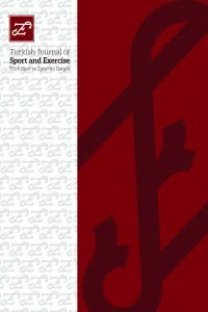Müsabaka arası içilen maden suyunun serum elektrolit düzeylerine etkisi
The effects of the mineral water drunk during the break of the competition on the serum electrolyte levels
___
- 1. Ashizawa N, Ouchi G, Fujimura R ,Yoshida Y, Tokuyama K, Suzuki M. Effects of a single bout of resistance exercise on calcium and bone metabolism in untrained young males. Calcif Tissue Int. 1998; 62(2): 104-8.
- 2. Burke LM. Nutritional needs for exercise in the heat. Comp Biochem Physiol A Mol Integr Physiol. 2001; 128(4): 735-48.
- 3. Demirkan E, Koz M, Kutlu M. Sporcularda Dehidrasyonun Performans Üzerine Etkileri ve Vücut Hidrasyon Düzeyinin İzlenmesi. Spormetre Beden Eğitimi ve Spor Bilimleri Dergisi. 2010; 8(3): 81-92.
- 4. Grimston SK, Tanguay KE, Gundberg CM, Hanley DA. The calciotropic hormone response to changes in serum calcium during exercise in female long distance runners. J Clin Endocrinol Metab. 1993;76(4):867-72.
- 5. Kalaycıoğlu L, Serpek B, Nizamlıoğlu M, Başpınar N, Tiftik AM. Biyokimya. 2. Baskı. Konya, s42-43. 2000.
- 6. Kavouras SA. Assessing Hydration Status. Curr Opin Clin Nutr Metab Care, 2002; 5(5): 519–24.
- 7. Maughan RJ, Leiper JB, Shirreffs SM. Rehydration And Recovery After Exercise. Sports Science Exchange. 1996; 9 (3)1-5.
- 8. Maughan RJ, Merson SJ, Broad NP, Shirreffs SM. Fluid and electrolyte intake and loss in elite soccer players during training. Int J Sport Nutr Exerc Metab. 2004; 14(3):333-46.
- 9. Maughan RJ, Shirreffs SM, Merson SJ, Horswill CA. Fluid And Electrolyte Balance in Elite Male Football (Soccer) Players Training in A Cool Environment. J Sports Scien. 2005; 23:63–79.
- 10. Maughan RJ, Shirreff SM. Dehydration and rehydration in competative sport. Scand J Med Sci Sports. 2010: 20(3): 40–47.
- 11. Maughan RJ, Watson P, Evans GH, Broad N, Shirreffs S. Water Balance And Salt Losses in Competitive Football. Int J Sport Nutr Exerc Metab. 2007; 17: 583- 594.
- 12. Montain SJ. Hydration Recommendations for Sport 2008. Curr Sports Med Rep. 2008; 7(4): 187-92.
- 13. Rehrer NJ. Fluid and Electrolyte Balance in Ultra- Endurance Sport. Sports Med. 2001; 31(10): 701–715.
- 14. Sawka MN, Burke LM, Eichner ER, Maughan RJ, Montain SJ, Stachenfeld NS. Exercise and fluid replacement. American College of Sports Medicine. 2007; 39 (2): 377-390.
- 15. Sawka MN, Cheuvront, SN, Carter R. Human Water Needs. Nutr Rev. 2005; 63 (6) 30–9.
- 16. Sawka MN, Montaın SJ, Latzka WA. Hydration effects on thermoregulation and performance in the heat. Comp Biochem Physiol A Mol Integr Physiol. 2001; 128(4): 679–90.
- 17. Shirreffs SM, Maughan RJ. Urine Osmolality and Conductivity as Indices of Hydration Status in Athletes in The Heat. Med Sci Sports Exerc. 1998; 30(11): 1598–602.
- 18. Shirreffs SM, Sawka MN, Stone M. Water and electrolyte needs for Football Training And Match- Play. J Sports Sci. 2006; 24(7): 699-707.
- 19. Tenan MS, McMurray RG, Hosick PA, Hackney AC. Changes in Plasma Potassium During Graded Aerobic Exercise and Two Hours of Recovery. Journal of Human Kinetics. 2010; 26: 45-49.
- 20. Valentine V. The importance of salt in the athlete's diet. Curr Sports Med Rep. 2007; 6: 237-240.
- 21. Von Duvillard SP, Braun WA, Melissa M, Beneke R, Leithäuser R. Fluids and Hydration in Prolonged Endurance Performance. Nutrition. 2004; 20 (7) 651– 56.
- ISSN: 1300-9915
- Yayın Aralığı: Yıllık
- Başlangıç: 2018
- Yayıncı: -
Syed Kamaruzaman SYED ALI, Julismah JANI
Özlem SARIOĞLU, OSMAN İMAMOĞLU, TÜLİN ATAN, MEHMET TÜRKMEN, PELİN AKYOL
ADEM CİVAN, İlyas ÖZDEMİR, İsmail TAŞ, Ayhan ÇELİK
Haltercilerde fiziksel yapı ve rölatif kuvvet ilişkisinin araştırılması
Latif AYDOS, AHMET UZUN, Raif ÖZEL, Erdinç ESEN
Süleyman CAN, ERDİL DURUKAN, AHMET ŞADAN ÖKMEN, OSMAN DALAMAN, Alper YORULMAZ
Müsabaka arası içilen maden suyunun serum elektrolit düzeylerine etkisi
ERSAN KARA, MUSTAFA AKIL, IŞIL IŞIK ANDSOY, MURAT ACAT, TUĞBA GÜNGÖR
9-11 Yaş grubu çocukların temel hareket becerilerinin örüntüleşmesinde yaratıcı drama’nın etkisi
MÜMİNE SOYTÜRK, HÜSEYİN ÇAMLIYER, ÖZDEN TEPEKÖYLÜ ÖZTÜRK, DAŞDAN E. Nilay ADA
Gençlerin serbest zaman aktivitelerine katılamama nedenleri üzerine bir inceleme
Okul yöneticilerinin etik liderlik davranışlarına ilişkin beden eğitimi öğretmenlerinin görüşleri
